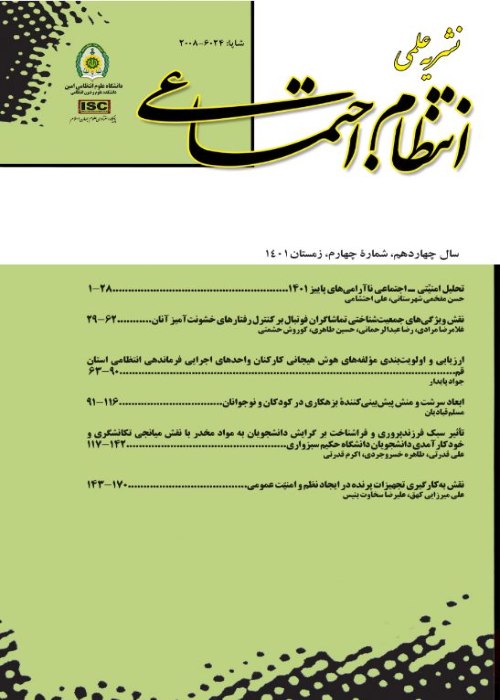Study on the Iranian Elite's Approach to the Social Order
Author(s):
Abstract:
The main motive for proceeding with elites’ approach to the social order is due to removing the wonder arising from paradox between two different approaches on social order in Iranian society so that on one side, the attitude of many people and elites of the society is based on solving the problems and disorders arising from disorderliness in the cultural, social, political and economical contexts to believe the application of force and power and on the other side, a lot of elites and people emphasize on the cooperation and collaboration of people for solving the problems and ultimately they don’t deem the collaborative approach to have the required efficiency for solving the problems of Iranian society. Therefore, in this study, the approach of elites to the order in economical, social, political and cultural aspects has been studied as this main question that the elites tend more to which one of the both approaches? The methodology of the extant paper as respect to the objective is applieddevelopmental and the procedure for collecting data is descriptive-survey. The statistical society is consisted of all elites residing in Tehran out of them 234 persons had been selected through purposive sampling in 2011. The data have been collected by researcher-made questionnaire. The findings of this study indicate that the most disciplinary approach of elites is related to political order with the mean value of 3.64 and standard deviation 0.83. As well as,the most integrated approach of elites is related to the social order with the mean value of 1.89 and standard deviation 0.79. The elites’ approach to the economical order with the mean value of 2 and standard deviation 0.82 is placed in the context of solidarity order. But their approach to the cultural order with the mean value of 2.74 and standard deviation 0.81 is placed in the context of eclectic order tending to solidarity order. In other word, grading the elites’ approach to the order in the four aspects of solidarity to disciplinary order is as follows: 1- social order, 2- economical order, 3- cultural order and 4- political order. The summary of this study indicates that the elites’ approach to the social order is an eclectic tending to solidarity order, in simpler word, the elites for establishing a stable and appropriate order, the elites believe in cooperation and collaboration of people, but this belief is not hundred percent. Thus, besides using public collaborations, they believe in application of force and power. As the viewpoint of elites, establishmentof appropriate and stable order is firstly realized by the cooperation and collaboration of people and then by means of force and power.
Keywords:
Language:
Persian
Published:
Entezam - e - Ejtemaei, Volume:4 Issue: 2, 2013
Page:
7
magiran.com/p1108212
دانلود و مطالعه متن این مقاله با یکی از روشهای زیر امکان پذیر است:
اشتراک شخصی
با عضویت و پرداخت آنلاین حق اشتراک یکساله به مبلغ 1,390,000ريال میتوانید 70 عنوان مطلب دانلود کنید!
اشتراک سازمانی
به کتابخانه دانشگاه یا محل کار خود پیشنهاد کنید تا اشتراک سازمانی این پایگاه را برای دسترسی نامحدود همه کاربران به متن مطالب تهیه نمایند!
توجه!
- حق عضویت دریافتی صرف حمایت از نشریات عضو و نگهداری، تکمیل و توسعه مگیران میشود.
- پرداخت حق اشتراک و دانلود مقالات اجازه بازنشر آن در سایر رسانههای چاپی و دیجیتال را به کاربر نمیدهد.
In order to view content subscription is required
Personal subscription
Subscribe magiran.com for 70 € euros via PayPal and download 70 articles during a year.
Organization subscription
Please contact us to subscribe your university or library for unlimited access!


